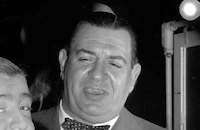Sync sound made the movie musicals possible, and sound's very early years are filled with enthusiastic experiments about the best way to bring the excitement of Broadway to the silver screen. Hollywood Revue of 1929 (1929), directed by Charles Reisner, was one of the first, and following its success MGM tapped him again to direct Chasing Rainbows, a backstage musical with more of a plot than Hollywood Revue, but just barely. Eddie Rock (vaudevillian Jack Benny, in his first film role) is manager of a motley group of performers in the show "Goodbye Broadway". Between the roving eye of show star Terry (Charles King) and squabbles between Bonnie (Marie Dressler) and Polly (Polly Moran) it's a wonder the show ever gets off the ground. Like many movies of this era, the original print included now-lost two-strip Technicolor scenes, but what proved even more lasting is the song "Happy Days Are Here Again", which made its debut here and would become Franklin D. Roosevelt's campaign song in 1932.
By Violet LeVoit
Chasing Rainbows

Brief Synopsis
Musical performers fall in love while rehearsing for the big show.
Cast & Crew
Read More
Charles F. Reisner
Director
Bessie Love
Carlie
Charles King
Terry
Jack Benny
Eddie
George K. Arthur
Loster
Polly Moran
Polly
Film Details
Also Known As
The Road Show
Genre
Musical
Comedy
Release Date
Jan
10,
1930
Premiere Information
not available
Production Company
Metro-Goldwyn-Mayer Pictures
Country
United States
Technical Specs
Duration
1h 40m
Sound
Mono (MovieTone)
Color
Black and White, Color (Technicolor)
Film Length
8,100ft
(11 reels)

Synopsis
Carlie and Terry constitute a vaudeville team in a traveling musical show; also in the company are Eddie, the stage manager; Bonnie, a comedienne; and Polly, the wardrobe mistress. Terry's habit of constantly falling in love with the leading lady causes him to marry Daphne, a two-timing songstress. When he finds her with another man, Eddie threatens to kill himself, but his little partner reassures him that "Happy Days Are Here Again," and the show goes on.

Director

Charles F. Reisner
Director
Cast

Bessie Love
Carlie
Charles King
Terry

Jack Benny
Eddie
George K. Arthur
Loster

Polly Moran
Polly

Gwen Lee
Peggy
Nita Martan
Daphne
Eddie Phillips
Cordova

Marie Dressler
Bonnie
Youcca Troubetzkoy
Lanning
Crew
Milton Ager
Composer
Louis Alter
Interpolations
Louis Alter
Composer
Al Boasberg
Dial
Sam Coslow
Composer
David Cox
Wardrobe
Gus Edwards
Interpolations
Fred Fisher
Interpolations
Russell Franks
Recording Engineer
Cedric Gibbons
Art Director
Joe Goodwin
Interpolations
Joe Goodwin
Composer
George Hively
Film Editor
Robert Hopkins
Dial
Jack Jordon
Sound Assistant
Arthur Lange
Interpolations
Bess Meredyth
Story
Bess Meredyth
Cont
Reggie Montgomery
Interpolations
Ira Morgan
Director of Photography
J. F. Murray
Interpolations
Kenyon Nicholson
Dial
Charles F. Reisner
Dial
Leo Robin
Composer
Wells Root
Adaptation
Douglas Shearer
Recording Engineer
George Ward
Interpolations
Richard A. Whiting
Composer
Jack Yellen
Composer

Film Details
Also Known As
The Road Show
Genre
Musical
Comedy
Release Date
Jan
10,
1930
Premiere Information
not available
Production Company
Metro-Goldwyn-Mayer Pictures
Country
United States
Technical Specs
Duration
1h 40m
Sound
Mono (MovieTone)
Color
Black and White, Color (Technicolor)
Film Length
8,100ft
(11 reels)

Articles
Chasing Rainbows (1930) -

Chasing Rainbows (1930) -
Sync sound made the movie musicals possible, and sound's very early years are filled with enthusiastic experiments about the best way to bring the excitement of Broadway to the silver screen. Hollywood Revue of 1929 (1929), directed by Charles Reisner, was one of the first, and following its success MGM tapped him again to direct Chasing Rainbows, a backstage musical with more of a plot than Hollywood Revue, but just barely. Eddie Rock (vaudevillian Jack Benny, in his first film role) is manager of a motley group of performers in the show "Goodbye Broadway". Between the roving eye of show star Terry (Charles King) and squabbles between Bonnie (Marie Dressler) and Polly (Polly Moran) it's a wonder the show ever gets off the ground. Like many movies of this era, the original print included now-lost two-strip Technicolor scenes, but what proved even more lasting is the song "Happy Days Are Here Again", which made its debut here and would become Franklin D. Roosevelt's campaign song in 1932.
By Violet LeVoit
Quotes
Trivia
Notes
Initially reviewed as The Road Show.















